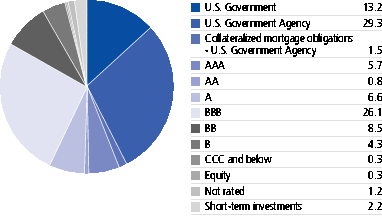Credit and counterparty risk. The issuer or guarantor of a fixed-income security, the counterparty to an over-the-counter derivatives contract, or a borrower of fund securities may not make timely payments or otherwise honor its obligations. U.S. government securities are subject to varying degrees of credit risk depending upon the nature of their support. A downgrade or default affecting any of the fund’s securities could affect the fund’s performance.
Cybersecurity and operational risk. Cybersecurity breaches may allow an unauthorized party to gain access to fund assets, customer data, or proprietary information, or cause a fund or its service providers to suffer data corruption or lose operational functionality. Similar incidents affecting issuers of a fund’s securities may negatively impact performance. Operational risk may arise from human error, error by third parties, communication errors, or technology failures, among other causes.
Economic and market events risk. Events in the U.S. and global financial markets, including actions taken by the U.S. Federal Reserve or foreign central banks to stimulate or stabilize economic growth, may at times result in unusually high market volatility, which could negatively impact performance. Reduced liquidity in credit and fixed-income markets could adversely affect issuers worldwide. Financial institutions could suffer losses as interest rates rise or economic conditions deteriorate.
As a result of continued political tensions and armed conflicts, including the Russian invasion of Ukraine commencing in February of 2022, the extent and ultimate result of which are unknown at this time, the United States and the European Union, along with the regulatory bodies of a number of countries, have imposed economic sanctions on certain Russian corporate entities and individuals, and certain sectors of Russia’s economy, which may result in, among other things, the continued devaluation of Russian currency, a downgrade in the country’s credit rating, and/or a decline in the value and liquidity of Russian securities, property or interests. These sanctions could also result in the immediate freeze of Russian securities and/or funds invested in prohibited assets, impairing the ability of a fund to buy, sell, receive or deliver those securities and/or assets. Economic sanctions and other actions against Russian institutions, companies, and individuals resulting from the ongoing conflict may also have a substantial negative impact on other economies and securities markets both regionally and globally, as well as on companies with operations in the conflict region, the extent to which is unknown at this time.
A widespread health crisis such as a global pandemic could cause substantial market volatility, exchange trading suspensions and closures, and affect fund performance. For example, the coronavirus disease (COVID-19) has resulted and may continue to result in significant disruptions to global business activity and market volatility due to disruptions in market access, resource availability, facilities operations, imposition of tariffs, export controls and supply chain disruption, among others. The impact of a health crisis and other epidemics and pandemics that may arise in the future, could affect the global economy in ways that cannot necessarily be foreseen at the present time. A health crisis may exacerbate other preexisting political, social, and economic risks. Any such impact could adversely affect the fund’s performance, resulting in losses to your investment.
Emerging Markets risk. The risks of investing in foreign securities are magnified in emerging markets. Emerging-market countries may experience higher inflation, interest rates, and unemployment and greater social, economic, and political uncertainties than more developed countries.
Equity securities risk. The price of equity securities may decline due to changes in a company’s financial condition or overall market conditions.
ESG integration risk. The manager considers ESG factors that it deems relevant or additive, along with other material factors and analysis, when managing the fund. The manager may consider these ESG factors on all or a meaningful portion of the fund’s investments. In certain situations, the extent to which these ESG factors may be applied according to the manager’s integrated investment process may not include U.S. Treasuries, government securities, or other asset classes. ESG factors may include, but are not limited to, matters regarding board diversity, climate change policies, and supply chain and human rights policies. Incorporating ESG criteria and making investment decisions based on certain ESG characteristics, as determined by the manager, carries the risk that the








